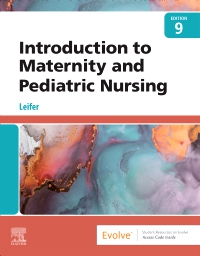
Introduction to Maternity and Pediatric Nursing - Elsevier eBook on VitalSource, 9th Edition
Elsevier eBook on VitalSource

Help your students build the knowledge and clinical judgment needed in maternity and pediatric nursing! Written in a clear, easy-to-read style, Introduction to Maternity and Pediatric Nursing, 9th Edition describes how nurses can provide effective, evidence-based care for women during pregnancy, labor, and delivery, and for newborns and growing children. The text spans the continuum of child development, organizing topics from simple to complex and from health to illness; this approach makes it easy to locate information. Another hallmark of the book is its strong focus on family-centered care, health promotion, and illness prevention. A perennial bestseller, this text includes new Next-Generation NCLEX® exam-style case studies plus updates on infection control, pandemic responses, and more.
Newer Edition Available
Leifer’s Introduction to Maternity and Pediatric Nursing - Elsevier eBook on VitalSource
-
- NEW! Next-Generation NCLEX® examination-style case studies include new-format questions to help students prepare for the licensure examination
- NEW! Discussion of the NCSBN Clinical Judgment Measurement Model helps students learn decision making and develop the skills needed to plan effective nursing interventions
- NEW! Thorough updates include infection control, pandemic responses, pharmacologic tables, and pediatric treatments
- Unfolding case studies follow one family through the conception and birth process, and include open-ended critical thinking questions applying the content to practice
- More than 25 nursing care plans include nursing diagnoses plus goals, nursing interventions, and rationales, along with critical thinking questions to promote clinical decision-making skills
- Detailed nursing skills cover a wide range of maternal and pediatric nursing interventions
- Safety alerts highlight the importance of protecting patients and others from accidents, medication errors, and the spread of disease
- Nursing tips include practical, evidence-based information applicable in the clinical setting
- Nursing guidelines reflect the World Health Organization’s Baby Friendly Hospital Initiative, alternative therapies, immunization mandates, emergency preparedness, preventing medication errors, and more
- Get Ready for the NCLEX® Examination! at the end of each chapter includes a summary of key points, additional online resources, review questions, and critical thinking questions
- Cultural Considerations boxes help students address the needs of culturally diverse patients and families
- Patient Teaching boxes help nurses communicate instructions for self-care with patients and families
- Medication tables provide quick access to information about commonly used medications
-
- NEW! Next-Generation NCLEX® examination-style case studies include new-format questions to help you prepare for the licensure examination
- NEW! Discussion of the NCSBN Clinical Judgment Measurement Model helps you learn decision making and develop the skills needed to plan effective nursing interventions
- NEW! Thorough updates include infection control, pandemic responses, pharmacologic tables, and pediatric treatments
-
UNIT I AN OVERVIEW OF MATERNITY AND PEDIATRIC NURSING
1. The Past, Present, and Future
UNIT II MATERNAL-NEWBORN NURSING AND WOMEN’S HEALTH
2. Human Reproductive Anatomy and Physiology
3. Fetal Development
4. Prenatal Care and Adaptations to Pregnancy
5. Nursing Care of Women with Complications During Pregnancy
6. Nursing Care of Mother and Infant During Labor and Birth
7. Nursing Management of Pain During Labor and Birth
8. Nursing Care of Women with Complications During Labor and Birth
9. The Family After Birth
10. Nursing Care of Women with Complications After Birth
11. The Nurse’s Role in Women’s Health Care
12. The Term Newborn
13. Preterm and Postterm Newborns
14. The Newborn with a Perinatal Injury or Congenital Malformation
UNIT III THE GROWING CHILD AND FAMILY
15. An Overview of Growth, Development, and Nutrition
16. The Infant
17. The Toddler
18. The Preschool Child
19. The School-Age Child
20. The Adolescent
UNIT IV ADAPTING CARE TO THE PEDIATRIC PATIENT
21. The Child’s Experience of Hospitalization
22. Health Care Adaptations for the Child and Family
UNIT V THE CHILD NEEDING NURSING CARE
23. The Child with a Sensory or Neurological Condition
24. The Child with a Musculoskeletal Condition
25. The Child with a Respiratory Disorder
26. The Child with a Cardiovascular Disorder
27. The Child with a Condition of the Blood, Blood-Forming Organs, or Lymphatic System
28. The Child with a Gastrointestinal Condition
29. The Child with a Genitourinary Condition
30. The Child with a Skin Condition
31. The Child with a Metabolic Condition
32. Childhood Communicable Diseases, Bioterrorism, Natural Disasters, and the Maternal-Child Patient
33. The Child with an Emotional or Behavioral Condition
UNIT VI THE CHANGING HEALTH CARE ENVIRONMENT
34 .Complementary and Alternative Therapies in Maternity and Pediatric Nursing







 as described in our
as described in our 